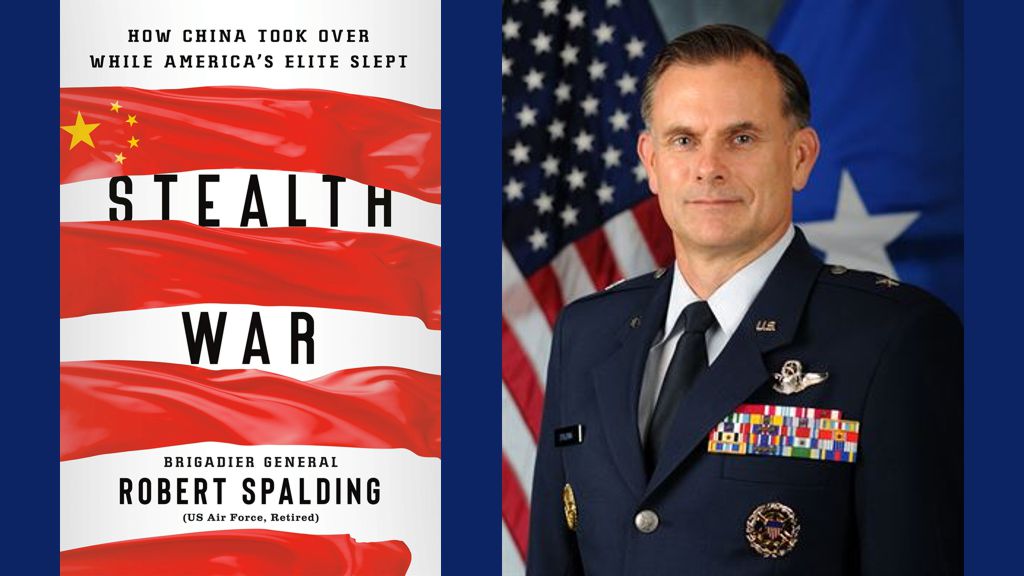China expert Robert Spalding reveals the shocking success China has had infiltrating American institutions and compromising our national security.
The media often suggest that Russia poses the greatest threat to America’s national security, but the real danger lies farther east. While those in power have been distracted and disorderly, China has waged a six-front war on America’s economy, military, diplomacy, technology, education, and infrastructure–and they’re winning. It’s almost too late to undo the shocking, though nearly invisible, victories of the Chinese.
In Stealth War, retired Air Force Brigadier General Robert Spalding reveals China’s motives and secret attacks on the West. Chronicling how our leaders have failed to protect us over recent decades, he provides shocking evidence of some of China’s most brilliant ploys, including:
• Placing Confucius Institutes in universities across the United States that serve to monitor and control Chinese students on campus and spread communist narratives to unsuspecting American students.
• Offering enormous sums to American experts who create investment funds that funnel technology to China.
• Signing a thirty-year agreement with the US that allows China to share peaceful nuclear technology, ensuring that they have access to American nuclear know-how.
Spalding’s concern isn’t merely that America could lose its position on the world stage. More urgently, the Chinese Communist Party has a fundamental loathing of the legal protections America grants its people and seeks to create a world without those rights.
Despite all the damage done so far, Spalding shows how it’s still possible for the U.S. and the rest of the free world to combat–and win–China’s stealth war.
Editorial Reviews
Review
“[A] searing exposé of how the Chinese Communist Party continues to conduct its war for
influence around the world.”
―Washington Examiner
“As the former US Department of Defense attaché to China, General Spalding is in a unique position to offer a gripping tale of the multiple battlefronts of China’s war against America. Ten years from now, readers will remember this seminal work that accurately describes the current and future states of play between the world’s great powers.”
―J. Kyle Bass, Chief Investment Officer of Hayman Capital Management
About the Author
Robert Spalding retired from the U.S. Air Force as a brigadier general after more than 25 years of service. He is a former China strategist for the chairman of the Joint Chiefs of Staff and the Joint Staff at the Pentagon, as well as a senior defense official and defense attache to China. He earned his doctorate in economics and mathematics from the University of Missouri and is fluent in Mandarin.
Excerpt. © Reprinted by permission. All rights reserved.
Introduction
I know something about stealth. In 1998, I began training to pilot B‑2 Spirits, known far and wide as Stealth Bombers. The B‑2 was at that time the high- profile new weapon in the US Air Force arsenal, a dazzling, billion-dollar, high-tech machine that looked like it had flown in from a future century. Its “continuous curvature” allowed it to avoid detection by the electromagnetic waves used by radar systems to track objects. In other words, I learned to fly a plane that achieved something every military strategist has dreamed of: being invisible.
Twenty years later— having served as chief China strategist for the chairman of the Joint Chiefs of Staff and as senior US Defense official and Defense attaché to the People’s Republic of China— I left my position as senior director for strategic planning at the White House, deeply concerned about a different stealth weapon being turned against my country. For the past forty years, the Chinese Communist Party (CCP) has been playing a beautiful game. It is sophisticated yet simple. It is a competition to gain control and influence across the planet— and to achieve that outcome without resorting to military engagement.
Flying quietly below the radar, the CCP has been acquiring technology without paying a cent toward developing it, carefully taking control of the world’s shipping businesses, infiltrating our corporations and science laboratories, and using American investor dollars to float the cost of its own factories and companies— and then, adding insult to injury, insisting that that money stay in China.
War between nation-states in the twenty-first century looks much different than war in the nineteenth and twentieth centuries. Instead of bombs and bullets, it’s about ones and zeros and dollars and cents: economics, finance, data information, manufacturing, infrastructure, and communications. Control those fronts today, and you can win a war without firing a shot. It’s a simple, logical strategy. And it is one leaders in the West have been very slow to grasp.
Our political, military, corporate, and fiscal leaders have failed to recognize the subtle game the CCP has been playing. They have been operating, understandably, under the now outdated idea that war is fought only with bombs and bullets. The CCP strategy, however, is to fight in other ways, utilizing a variety of tactics. It advocates and sponsors a constant focus on theft, coercion, economic sabotage, and monopolization of infrastructure on a global level— all to increase China’s sphere of influence. Everywhere.
Like the B‑2 bombers I flew, the CCP’s stealth war isn’t truly covert. It has been hiding in plain sight. How did we miss it? I’m not interested in pointing fingers at one particular party. Both Republican and Democratic elites have missed the signs— or are complicit— and as a patriot who cares about my fellow citizens, my main interest is to defend the people of this country and the ideas that have driven it since it was founded.
Perhaps nothing threatens the CCP more than the Constitution of the United States. China’s president, Xi Jinping, has stated as much, and CCP documents that I will share make clear that fundamental American concepts—the rights of free speech and freedom of religion—are threats to the authoritarian power of the CCP, which believes that these liberties must never be allowed to take root in China and must never be the rights of Chinese citizens.
The CCP’s fundamental loathing of our Bill of Rights and other legal protections should be chilling to anyone who values freedom. It is the primary reason I am writing this book. I want to alert the world to China’s stealth war and its strategy to dominate the planet by focusing on six spheres of influence: the economy, the military, global diplomacy, technology, education, and infrastructure.
China is closing in on achieving its goal of influencing the politicians and corporations of the United States. If this happens, fundamental freedoms we take for granted— the ability to criticize a politician or a policy, to publish political statements, to report on governmental abuse or inefficiency, to sing the lyrics you want, to study literally any subject under the sun, to visit any website, no matter what ideology is espoused— will come under assault.







